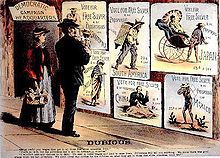Panic of 1896
Deflation of commodities' prices drove the stock market to new lows in a trend that began to reverse only after the 1896 Klondike Gold Rush.
In this speech, Bryan laid out his belief that the existence of multiple forms of legal tender was necessary for the health of the national economy, as farmers would benefit from being able to sell their crops at a higher price.
[3] Bryan became both the Democratic and the Populist party nominee, due in part to his stances on the issues of the gold standard, which he believed could alleviate the Panic of 1896.
Republican Party candidate William McKinley wished to remain on the gold standard, unlike his opponent, Bryan.
[8] A series of high-profile banker suicides took place in December 1896 and January 1897 in Chicago in the wake of the failure of the National Bank of Illinois along with the Adolph Luetgert murder case.
